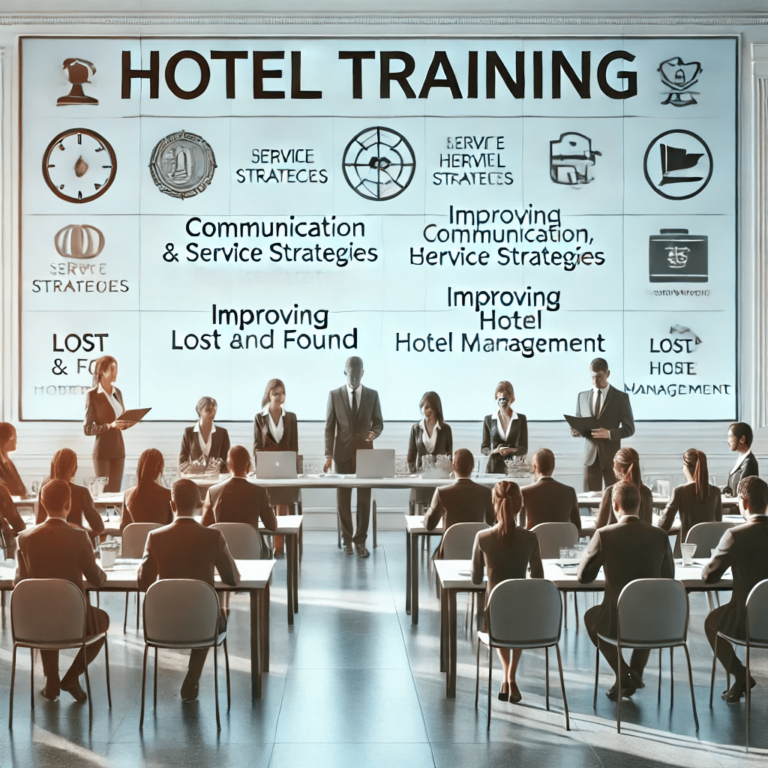Table of Contents:
- Introduction
- Why Hotel Staff Training is Crucial
- Types of Hotel Staff Training Programs
- Key Areas of Training for Hotel Employees
- Training and Development for Hotel Employees
- Specialized Training for Front Office Staff in Hotels
- The Role of Deliverback in Lost and Found Training
- Conclusion
1. Introduction
In the hospitality industry, guest satisfaction is directly influenced by how well hotel employees are trained. Hotel staff training is essential for improving operational efficiency, maintaining high standards, and ensuring a consistent guest experience. Well-trained employees not only handle routine tasks better but are also more adept at solving unexpected challenges, which enhances the overall hotel environment. This article delves into why hotel staff training is vital, covering various programs and specialized areas, including training for hotel employees and training for front office staff in hotels.
2. Why Hotel Staff Training is Crucial
Successful hotel staff training programs provide employees with the skills they need to excel in their roles. Whether it’s customer service, housekeeping, or handling guest issues, trained employees contribute to a smooth operation. In the competitive hotel industry, well-executed staff training in hotel industry operations ensures that employees can address guest needs promptly, resolve complaints efficiently, and handle special requests professionally.
By investing in training and development for hotel employees, hotels increase staff productivity, reduce turnover, and improve overall guest satisfaction. Whether for front desk clerks, housekeeping, or back-end operations, every hotel department benefits from ongoing training programs.
3. Types of Hotel Staff Training Programs
A successful hotel staff training program consists of structured, ongoing training that evolves with the hotel’s needs. The most common types of training programs in the hotel industry include:
Onboarding Programs: These are designed for new hires to help them integrate into the hotel’s culture, understand standard operating procedures (SOPs), and learn their roles.
Guest Service Training: This hotel staff training program focuses on enhancing customer interaction skills, teaching employees how to deal with difficult guests, handle complaints, and exceed guest expectations.
Technology Training: Hotels are adopting new technologies at a rapid pace. Training employees on property management systems (PMS) and customer service apps is crucial for smooth operations.
Compliance and Safety Training: This ensures that employees are aware of health and safety regulations, fire safety protocols, and any other legal requirements in the hospitality industry.
A continuous hotel staff training program empowers employees to stay updated on industry trends, new technologies, and innovative ways to improve guest experiences.
4. Key Areas of Training for Hotel Employees
Training for hotel employees extends across various areas, each essential for the smooth functioning of a hotel. The primary areas include:
Customer Service
Customer service is the foundation of hotel staff training. Employees are taught how to greet guests, handle check-ins, and respond to requests and complaints. Training should include conflict resolution and proactive communication strategies.
Housekeeping
Maintaining cleanliness is critical for guest satisfaction. Staff training in hotel industry housekeeping focuses on efficient cleaning techniques, safety protocols, and maintaining high standards of hygiene in both guest rooms and public spaces.
Food and Beverage
For hotels with restaurants, training for hotel employees involved in food and beverage service is essential. Training covers food safety, serving techniques, and how to offer personalized service to guests.
Maintenance
Maintenance staff needs to be trained in preventive measures to ensure that everything in the hotel, from air conditioning units to elevators, operates smoothly.
With well-rounded hotel staff training programs, each department functions cohesively, leading to a better guest experience and smoother operations.
5. Training and Development for Hotel Employees
Training and development for hotel employees is a continuous process that doesn’t stop after onboarding. Regular workshops, refresher courses, and updated training modules ensure employees are always equipped with the latest skills.
Ongoing training and development for hotel employees helps the hotel remain competitive by refining operational strategies, enhancing service, and fostering a work culture of continuous improvement. Employees who receive continuous training are more confident, adaptable, and better prepared to handle dynamic guest needs.
For example, hotels may implement mentorship programs or certifications in hospitality management. Such programs are designed to help employees progress within the hotel and equip them for leadership roles. This long-term training for hotel employees encourages retention and develops a more skilled workforce.
6. Specialized Training for Front Office Staff in Hotels
Training for front office staff in hotels is particularly important as they are often the first point of contact for guests. Ensuring smooth check-ins, managing reservations, and handling complaints are all part of the front desk’s responsibilities. Effective training for front office staff in hotels includes:
Operations Training: This covers how to use property management systems, assign rooms, and communicate with other departments like housekeeping.
Lost and Found Procedures: The front office often handles lost and found inquiries. Training employees to use tools like Deliverback ensures that guest items are logged, stored, and returned efficiently. By mastering these processes, front desk employees can quickly resolve lost item issues, leading to improved guest satisfaction.
Guest Communication: Front office staff must communicate clearly and empathetically with guests. This includes dealing with difficult situations and knowing how to escalate issues if necessary.
By focusing on training for front office staff in hotels, management ensures smooth day-to-day operations and boosts the hotel’s overall service quality.
7. The Role of Deliverback in Lost and Found Training
Lost and found management is an integral part of hotel staff training that directly impacts guest satisfaction. As part of a well-rounded hotel staff training program, hotels should integrate training on modern lost and found tools like Deliverback.
Deliverback is an innovative platform that simplifies the process of returning lost items to guests. By training staff to use Deliverback, hotels can ensure fast, reliable service when it comes to handling guest belongings. Proper training for front office staff in hotels should include logging items correctly, storing them securely, and using systems like Deliverback to track and ship items.
Incorporating Deliverback into your lost and found procedures streamlines the process for staff and reassures guests that their items will be returned safely. This fosters guest loyalty and enhances the hotel’s reputation for service excellence.
8. Conclusion
Hotel staff training is a critical factor in the success of any hotel. By providing comprehensive and ongoing training for hotel employees, hotels can improve operations, increase employee satisfaction, and deliver exceptional guest experiences.
Specialized training for front office staff in hotels, particularly in areas like lost and found management with Deliverback, ensures that guest issues are resolved efficiently. The integration of tools and technologies into staff training in hotel industry operations, along with personalized development plans, empowers employees to excel.
In conclusion, investing in a robust hotel staff training program results in smoother hotel operations, happier guests, and a more motivated workforce. Continuous training and development for hotel employees ensures that your hotel can adapt to changing industry trends, handle guest requests proficiently, and maintain a high standard of service. Whether you’re training new hires or refining the skills of seasoned employees, a well-executed training program is key to your hotel’s success.


